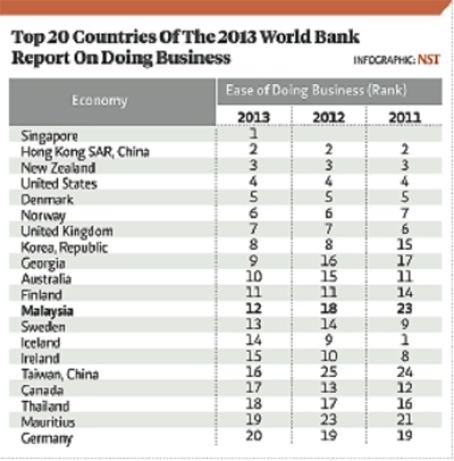Business of education
Professor Tan Sri Dato' Dzulkifli Abdul Razak
Learning Curve: Perspective
New Sunday Times - 04-11-2012
EASING THE WAY: Creating an environment more seamless and conducive to “doing” education
WITH the release of the recent Doing Business (DB) Report 2013 by The World Bank, which places Malaysia at 12th position among 185 countries, there is confidence that the country can do even better in future.
This is a move from the 23rd position in 2011 and 18th in 2012, putting Malaysia ahead of advanced economies such as Sweden (13th), Taiwan (16th), Germany (20th), Japan (24th) and Switzerland (28th).

The exercise is the 10th in a series of annual reports published by The World Bank and International Financial Corporation investigating the regulations that enhance business activity and those that constrain it.
The indicators in the report measure business regulations and the protection of property rights, and their effect on businesses, especially small and medium-sized domestic firms.
In the Association of Southeast Asian Countries (Asean), Malaysia is second after Singapore and fourth in Asia. The list of top 20 countries from the 185 which are easiest to do business is as per the table.
Other areas of significant improvement include Getting Electricity (an upward movement of 31 places to 28th position); Paying Taxes (a movement of 26 places to 15th spot); Registering Property (also a movement of 26 places to 33rd position); Trading Across Borders (a movement of 18 places to 11th position); and Dealing with Construction Permits (a movement of 17 places to 96th place).
In general, Malaysia improved its performance in five areas of doing business and maintained two. Marginal declines were registered in the other three areas. This means that Malaysia can improve even further to be in the top 10 position soon.
It must be mentioned that Malaysia is top among 185 economies on the ease of Getting Credit, and has been maintaining its first position consecutively for the last five years.
Malaysia also continues to be among the top five in Protecting Investors, assuming its fourth rank since 2007. In other words, being in the top five is not mission impossible for the country.
Overall, the report seeks to objectively measure business regulations on domestic firms by focusing on well-defined transactions, laws and institutions rather than generic, perception-based questions on the business environment.
It presents quantitative indicators for the regulations that apply to firms at different stages of their life cycle. This year's report covers 11 topics.
The World Bank also has acknowledged Malaysia as among the top 10 reformers within the Asia-Pacific Economic Cooperation region that made the most progress in regulatory practices.
It also identified several good practices from Malaysia. It cited the establishment of the Regulatory Reform Committee at the inter-ministerial level, namely the Special Task Force to Facilitate Business (PEMUDAH) works with ministries and agencies to bring about better procedural reforms.
This one best practice deserves the most applause since in most cases insular mindsets are usually the bottlenecks in making meaningful changes.
At times, it is not only inter-ministerial but also intra-ministerial, down to intra-departmental levels within the same ministry.
This issue is an open secret, it has been talked about in forums and dialogues but is a tough nut to crack.
Like it or not, this is the first place to start on the road to taking on the many transformational aspirations in Malaysia.
For example, in the context of education, an Education Delivery Unit will facilitate the transformation as envisaged in the Education Blueprint come year-end, the PEMUDAH way. It is after all about facilitating the ease of "doing" education by creating an environment more seamless and conducive to the business of education.
- The writer is the vice-chancellor of Albukhary International University
